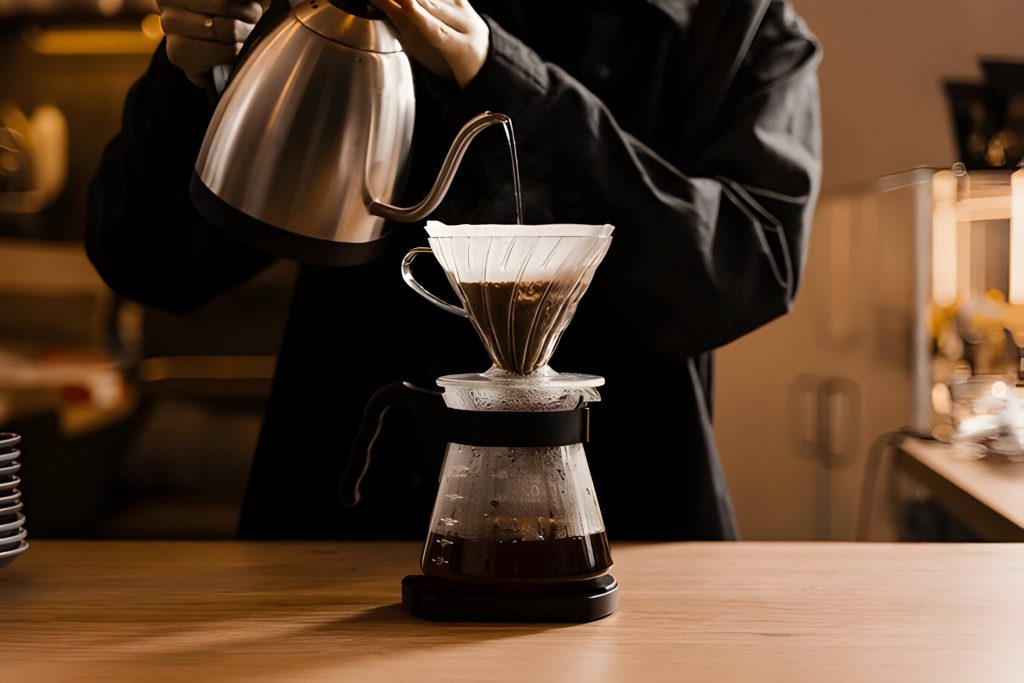Ketogenic diet coffee, a high-fat, low-carb beverage, has emerged as a popular trend among followers of the ketogenic lifestyle. This unique concoction combines brewed coffee with healthy fats like MCT oil, coconut oil, or grass-fed butter, aiming to support ketosis and provide sustained energy. As interest in this energizing drink grows, understanding its composition, benefits, and preparation methods becomes essential for those looking to incorporate it into their daily routine. This article explores the science behind keto coffee, its key ingredients, and how to brew the perfect cup while avoiding common pitfalls.
Understanding the Basics of Ketogenic Diet Coffee
Ketogenic diet coffee, often referred to as “keto coffee” or “bulletproof coffee,” is a high-fat, low-carb beverage that aligns with the principles of the ketogenic diet. This unique coffee blend typically consists of brewed coffee, grass-fed butter, and medium-chain triglyceride (MCT) oil. The combination of these ingredients creates a drink that’s not only rich in flavor but also supports the body’s state of ketosis.
The key to keto coffee lies in its macronutrient profile. By adding healthy fats to your morning brew, you’re increasing your fat intake while keeping carbohydrates low. This approach helps maintain the fat-burning state that’s central to the ketogenic diet. MCT oil, a common ingredient in keto coffee, is rapidly absorbed by the body and converted into ketones, which serve as an alternative energy source to glucose.
It’s important to note that while keto coffee can be a useful tool for those following a ketogenic diet, it should be consumed as part of a balanced, low-carb meal plan. The high calorie content of this beverage means it often replaces breakfast for many keto dieters. As with any dietary change, it’s advisable to consult with a healthcare professional before incorporating keto coffee into your routine, especially if you have any pre-existing health conditions.
The Science Behind Ketogenic Diet Coffee and Its Benefits
The ketogenic diet coffee, often referred to as “keto coffee,” has gained popularity among health enthusiasts for its potential to enhance the benefits of a ketogenic lifestyle. This unique beverage combines coffee with high-fat ingredients, typically butter and MCT oil, to create a drink that aligns with the principles of ketosis.
When consumed, the high fat content in keto coffee helps maintain ketosis, a metabolic state where the body burns fat for fuel instead of carbohydrates. This process can lead to increased fat-burning and weight loss. Additionally, the combination of caffeine and healthy fats provides a sustained energy boost, helping to improve mental clarity and focus throughout the day.
One of the key benefits of keto coffee is its ability to suppress appetite. The high fat content promotes feelings of fullness, potentially reducing overall calorie intake. Moreover, the MCT oil in keto coffee is rapidly absorbed by the body, providing quick energy and potentially enhancing cognitive function.
Essential Ingredients for the Perfect Keto Coffee
Crafting the perfect keto coffee requires a careful selection of ingredients that align with the high-fat, low-carb principles of the ketogenic diet. MCT oil, derived from coconuts, is a cornerstone ingredient that provides quick energy and supports ketosis. Grass-fed butter, rich in beneficial fatty acids and vitamins, adds a creamy texture and satiating properties to your brew.
For those who prefer a dairy-free option, coconut oil serves as an excellent alternative, offering similar benefits to MCT oil. Heavy cream is another popular addition, providing richness and helping to curb hunger throughout the day. To satisfy your sweet tooth without compromising ketosis, sugar-free sweeteners like stevia, erythritol, or monk fruit extract can be used in moderation.
When combining these ingredients, it’s essential to start with small amounts and gradually increase to find your ideal balance. Remember, the goal is to create a delicious, energizing beverage that supports your ketogenic lifestyle while keeping carbohydrates to a minimum.
Step-by-Step Guide to Brewing Ketogenic Diet Coffee

Brewing the perfect ketogenic diet coffee requires attention to detail and specific techniques. Start by selecting high-quality, freshly roasted coffee beans. Grind them just before brewing for optimal flavor. Choose your preferred brewing method, such as French press or pour-over, as these allow for better control over the extraction process.
For a basic keto coffee recipe, brew your coffee as usual, then add 1-2 tablespoons of grass-fed butter and 1-2 tablespoons of MCT oil. Use a blender to emulsify the mixture for 20-30 seconds, creating a creamy, frothy texture. The blending technique is crucial for properly incorporating the fats and achieving a smooth consistency.
Temperature considerations are important when brewing keto coffee. Aim for water between 195°F and 205°F (90°C-96°C) for optimal extraction. When adding fats, ensure your coffee is hot enough to melt the butter but not so hot that it destroys the beneficial compounds in the MCT oil.
Experiment with different keto coffee recipes by adding flavorings like cinnamon, vanilla extract, or sugar-free syrups. Some enthusiasts enjoy including collagen peptides for added protein. Remember to adjust the ratios of fats and additives to suit your taste preferences and nutritional goals while maintaining ketosis.
Common Mistakes to Avoid When Making Keto Coffee
When preparing keto coffee, several common mistakes can hinder your progress and enjoyment of this popular low-carb beverage. One frequent error is using incorrect ratios of ingredients, which can throw off the balance of fats and potentially kick you out of ketosis. It’s crucial to measure your ingredients carefully and stick to recommended proportions.
Another pitfall is using poor quality ingredients. Opt for high-quality, organic coffee beans and grass-fed butter or ghee to maximize nutritional benefits and flavor. Low-grade MCT oil or artificial sweeteners can detract from the overall experience and potentially cause digestive issues.
Overconsuming calories is a trap many fall into when first introducing keto coffee to their diet. While it’s a nutrient-dense drink, it’s important to remember that it still contributes to your daily caloric intake. Be mindful of portion sizes and adjust your other meals accordingly to maintain a calorie deficit if weight loss is your goal.
Lastly, neglecting electrolytes is a common oversight. The diuretic effect of coffee combined with the low-carb nature of the keto diet can lead to electrolyte imbalances. Consider adding a pinch of salt to your keto coffee or ensuring you’re getting enough electrolytes through other sources in your diet to avoid symptoms like fatigue and headaches.
Incorporating Ketogenic Diet Coffee into Your Daily Routine
Ketogenic diet coffee, often referred to as “keto coffee,” can be a versatile addition to your daily routine. This high-fat, low-carb beverage can serve multiple purposes throughout your day. As a meal replacement, keto coffee provides a satisfying blend of healthy fats and caffeine, keeping you full and energized for hours. Many fitness enthusiasts use it as a pre-workout drink, leveraging its energy-boosting properties to enhance performance during exercise.
For those practicing intermittent fasting, keto coffee can be an excellent aid. Its high fat content helps maintain ketosis without breaking your fast, making it easier to extend fasting periods. Additionally, it serves as an ideal afternoon pick-me-up, offering a cognitive boost without the crash often associated with sugary alternatives.
To maximize the benefits of keto coffee, experiment with different timings and recipes to find what works best for your lifestyle and goals. Whether you’re looking to support weight loss, improve mental clarity, or simply enjoy a delicious and nutritious beverage, incorporating keto coffee into your daily routine can be a game-changer for your ketogenic journey.
Variations and Flavoring Options for Keto Coffee
Keto coffee enthusiasts have a wide array of options to enhance their morning brew without compromising their low-carb lifestyle. Sugar-free syrups offer a convenient way to add sweetness and flavor, with popular choices including vanilla, hazelnut, and caramel. For those seeking a more natural approach, spices like cinnamon, nutmeg, or cardamom can add depth and warmth to your cup.
Extracts are another excellent option for flavoring keto coffee. Vanilla, almond, or peppermint extracts can transform your drink without adding carbs. For added nutritional benefits, consider incorporating collagen peptides, which support skin, hair, and joint health while being virtually tasteless in your coffee.
Adaptogens, such as ashwagandha or mushroom powders, are gaining popularity among health-conscious coffee drinkers. These ingredients can potentially help manage stress and boost overall well-being. When experimenting with these additions, start with small amounts to find your perfect balance of flavor and function in your keto coffee routine.
Potential Side Effects and Precautions of Ketogenic Diet Coffee

While ketogenic diet coffee can offer numerous benefits, it’s essential to be aware of potential side effects and take necessary precautions. Caffeine sensitivity is a common concern, as some individuals may experience jitters, anxiety, or sleep disturbances when consuming high-fat coffee. It’s advisable to monitor your caffeine intake and adjust accordingly.
Digestive issues may arise for some people, especially when first introducing high amounts of fat to their diet. Start with small quantities and gradually increase to allow your body to adapt. Additionally, be mindful of nutrient deficiencies that can occur on a ketogenic diet. Ensure you’re consuming a variety of nutrient-dense foods alongside your keto coffee to maintain a balanced diet.
The “keto flu” is another consideration, characterized by symptoms like fatigue, headaches, and irritability as your body adjusts to a low-carb, high-fat diet. Staying hydrated and maintaining proper electrolyte balance can help mitigate these effects. Always consult with a healthcare professional before making significant changes to your diet, especially if you have pre-existing health conditions or are taking medications.
Elevate Your Ketogenic Lifestyle with the Perfect Cup of Keto Coffee
Keto coffee is more than just a trendy beverage; it’s a powerful tool for those committed to a ketogenic lifestyle. By incorporating the right ingredients and preparation methods, you can create a delicious and nutritious drink that supports your low-carb, high-fat diet goals. Remember that the key to a perfect cup of keto coffee lies in choosing high-quality fats, experimenting with flavors, and finding the right balance that works for your taste preferences and nutritional needs.
As you embark on your keto coffee journey, don’t be afraid to try different variations and adjust the recipe to suit your individual requirements. Whether you’re looking for an energy boost, a way to curb cravings, or simply a satisfying morning ritual, keto coffee can be tailored to meet your needs. With its potential benefits for mental clarity, sustained energy, and weight management, this beverage can become an integral part of your ketogenic routine.
The perfect cup of keto coffee is the one that not only aligns with your dietary goals but also brings you joy and satisfaction. So, grab your favorite mug, blend up your personalized keto coffee creation, and savor the rich, creamy goodness that supports your health and wellness journey.
